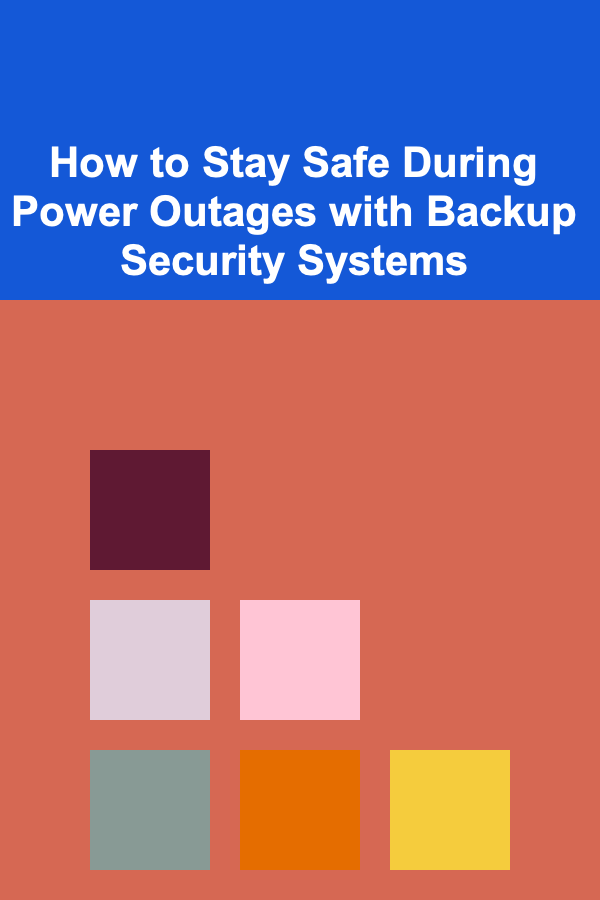
How to Stay Safe During Power Outages with Backup Security Systems
ebook include PDF & Audio bundle (Micro Guide)
$12.99$10.99
Limited Time Offer! Order within the next:

Power outages are an inevitable part of modern life. Whether caused by severe weather, technical failures, or even planned energy-saving measures, losing electricity can have significant consequences for your home's security. During power outages, your home becomes vulnerable to potential threats---burglars, fires, or even accidents due to limited visibility. Fortunately, there are various backup security systems and strategies that can help you stay safe and protect your home, even when the power goes out.
In this article, we will explore why it's crucial to prepare for power outages in terms of home security, what types of backup security systems are available, and how you can implement them to ensure the safety of your home, family, and valuables during power disruptions.
Understanding the Risks During Power Outages
Power outages can last anywhere from a few minutes to several days, depending on the cause and severity of the event. Unfortunately, during such times, the usual security measures that we rely on---like lights, alarm systems, and surveillance cameras---are rendered ineffective or disabled. As a result, you may be left exposed to several risks:
- Increased Vulnerability to Break-ins: Many burglars view power outages as prime opportunities to break into homes. With exterior lights turned off and security cameras unable to function, burglars can approach a home unnoticed. If alarm systems rely on electricity, they could fail, allowing intruders to bypass security systems without being detected.
- Limited Visibility: Without proper lighting, both inside and outside your home, visibility is compromised. This makes it difficult for you to identify threats or even move around safely. In the case of fires, carbon monoxide leaks, or medical emergencies, the lack of lighting can be dangerous.
- Inability to Monitor and Control Security Devices: Smart home systems and other security devices often rely on Wi-Fi or electricity to function. If your security system or surveillance cameras are connected to the grid, they could fail during a power outage. This leaves you without crucial monitoring capabilities when you need them the most.
- Reduced Communication: Power outages can also affect your ability to communicate with emergency services or loved ones. Without power, you may lose access to your phone charger or internet, making it harder to reach out for help during a crisis.
The Importance of Backup Security Systems
To mitigate the risks associated with power outages, it's essential to invest in backup security systems that can keep your home safe during such times. Backup security systems are designed to function independently of your main power grid, ensuring that critical security features remain operational. These systems not only help maintain your safety during an outage but also give you peace of mind, knowing that your home is still secure even when the lights go out.
Types of Backup Security Systems
1. Uninterruptible Power Supply (UPS)
One of the most important components of a backup security system is an Uninterruptible Power Supply (UPS). A UPS is a device that provides backup power to electrical devices in the event of a power failure. It works by storing electrical energy in batteries, which is then used to keep devices running during a power outage.
-
How It Works: When the power goes out, the UPS instantly switches to its battery reserve, ensuring that critical devices---such as security cameras, alarm systems, and smart home hubs---continue to function.
-
Advantages:
- A UPS ensures your security systems remain operational, giving you more time to react to potential threats or to transition to a larger backup power source (like a generator).
- It provides seamless protection, as there is no gap in power supply.
- UPS units are available in various capacities, allowing you to choose one that suits your security system's power requirements.
-
Limitations:
- A UPS is typically only suitable for providing power to smaller devices, such as cameras or alarms. It may not be able to power larger appliances like HVAC systems or refrigerators.
- The backup power duration depends on the UPS model and the power draw of your devices, with most units offering between 5 minutes and an hour of backup time.
-
Recommendation: Consider purchasing a high-capacity UPS that can support your critical security devices, including cameras, alarms, and smart locks. This will ensure that your security system remains functional even during short-term outages.
2. Backup Generators
For longer-term power outages, a backup generator is one of the most reliable options. Generators are designed to provide a continuous power supply by converting fuel (gasoline, diesel, or natural gas) into electricity. These systems are ideal for homes in areas prone to extended power outages due to weather, natural disasters, or other causes.
-
How It Works: Backup generators can be connected to your home's electrical system and automatically kick in when the main power goes out. They typically run on gasoline, diesel, or natural gas, depending on the model and your preference.
-
Advantages:
- Provides continuous power during extended outages, ensuring that your home's security systems (including lighting, alarms, and cameras) stay up and running.
- Can also power other essential home systems, such as heating or cooling, medical equipment, or refrigeration.
- Whole-house generators offer convenience, as they are designed to automatically start and stop based on the power grid's status.
-
Limitations:
- Generators can be expensive to purchase and install, with whole-house systems often costing several thousand dollars.
- Fuel must be stored and managed properly to ensure that the generator runs during an outage. Additionally, running a generator can produce noise, which might attract attention.
- Generators require regular maintenance and may need professional installation to ensure safety and proper integration with your home's electrical system.
-
Recommendation: If you live in an area where power outages are frequent or can last for several days, investing in a backup generator is a smart choice. Make sure to select a model that can power all the security devices you rely on, along with other essential systems.
3. Battery-Powered Security Cameras
Battery-powered security cameras are an excellent solution for keeping your home monitored during power outages. Unlike traditional wired cameras that rely on electricity to function, battery-powered cameras use rechargeable batteries to operate independently of the power grid.
-
How It Works: These cameras are equipped with long-lasting rechargeable batteries that can keep them running for weeks or even months without needing to be recharged. Many battery-powered cameras also come with cloud storage options, allowing you to access footage remotely through your smartphone.
-
Advantages:
- Battery-powered cameras are easy to install, as they don't require any wiring or professional installation.
- They offer complete freedom from electrical outlets, making them versatile and ideal for outdoor use or remote areas.
- Many models include features such as motion detection, night vision, and two-way audio, providing full surveillance capabilities during power outages.
-
Limitations:
- The main limitation of battery-powered cameras is the need to recharge the batteries periodically. However, many cameras now feature long-lasting batteries that can last several months on a single charge.
- Battery-powered cameras may have lower quality or fewer features compared to their wired counterparts.
-
Recommendation: Consider integrating battery-powered security cameras into your backup system, especially for critical entry points such as doors and windows. Look for models that offer long battery life and cloud storage to ensure continuous monitoring and quick access to footage.
4. Solar-Powered Security Systems
Solar-powered security systems are an environmentally friendly alternative to traditional backup systems. These systems rely on solar panels to generate power, which can then be used to operate cameras, alarms, and other security devices.
-
How It Works: Solar-powered security devices, such as cameras and lights, use solar panels to capture sunlight during the day and convert it into electrical energy. The stored energy is then used to power the system during the night or in the event of a power outage.
-
Advantages:
- Solar power is renewable and sustainable, reducing the need for conventional electricity and helping to lower your overall energy consumption.
- Solar-powered systems are ideal for remote or off-grid locations where access to traditional power sources may be limited.
- Once installed, solar-powered systems have low operating costs and minimal maintenance requirements.
-
Limitations:
- Solar-powered systems rely on sunlight, so their effectiveness may be diminished during overcast weather or long winter months with limited daylight.
- Initial installation costs can be high due to the need for solar panels, batteries, and related components.
-
Recommendation: For homeowners who live in sunny areas and are looking for an eco-friendly backup security solution, solar-powered security systems can be a great option. They can work in conjunction with other backup systems to provide reliable security during power outages.
5. Smart Home Integration with Backup Systems
One of the most effective ways to ensure your home stays secure during a power outage is by integrating your security system with smart home technology. Smart home systems can offer automation and control over your security devices, even when the power goes out.
-
How It Works: Smart home devices, such as lights, cameras, and locks, can be connected to a central hub or app on your smartphone. Even during a power outage, you can still receive notifications, monitor footage, and control your devices via the app, as long as the backup power system is in place.
-
Advantages:
- Provides remote control and monitoring, even during outages.
- Many smart devices include backup battery options, ensuring that they continue functioning without relying on the grid.
- Can be integrated with other smart home systems, such as smart thermostats, doorbell cameras, and motion sensors, for seamless operation.
-
Limitations:
- Smart home devices require an internet connection to function optimally. During an outage, internet connectivity may be lost, which can impact the functionality of some devices.
-
Recommendation: To fully enhance your home's security during power outages, integrate your security devices with a smart home hub that can be powered by a backup system. This will allow you to monitor and control your security system from anywhere, even when you're not at home.
Conclusion
Power outages pose a significant risk to home security, but with the right backup systems in place, you can ensure that your home remains protected during such events. Investing in devices like uninterruptible power supplies (UPS), backup generators, battery-powered cameras, solar-powered security systems, and smart home integration will help you maintain the safety of your home, even when the power goes out.
By taking the time to prepare for power outages with the right backup security systems, you not only safeguard your home against potential break-ins but also improve your overall preparedness for emergencies. Remember, a proactive approach to home security ensures peace of mind, whether you're home or away, during a power outage or on a regular day.
Reading More From Our Other Websites
- [Home Budget Decorating 101] How to Mix High-End and Budget-Friendly Decor for a Stylish Home
- [Personal Care Tips 101] How to Hydrate Your Nails and Cuticles with a Cuticle Oil Routine
- [Needle Felting Tip 101] The Ultimate Guide to Choosing the Right Needle Felting Tools
- [Personal Care Tips 101] How to Apply Blush Without Overdoing It
- [Home Lighting 101] How to Add a Touch of Luxury to Your Home with Statement Lighting
- [Home Party Planning 101] How to Organize a Stress-Free Home Party Timeline
- [Personal Investment 101] How to Build Wealth through Compound Investment Strategies
- [Home Pet Care 101] How to Maintain a Clean and Safe Home for Your Pet
- [Organization Tip 101] How to Use Pegboards for Versatile Home Organization
- [Personal Care Tips 101] How to Apply Eye Cream for a Cooling and Refreshing Effect

How to Budget for Home Repairs and Maintenance Costs
Read More
How To Memorize Verb Conjugations Painlessly
Read More
How to Optimize Your Virtual Events for Networking and Knowledge Sharing in Dropshipping
Read More
How To Promote Social Skills and Friendships
Read More
How to Set Realistic Financial Goals for the Year
Read More
How to Use Baskets for Organizing Snacks in the Pantry
Read MoreOther Products

How to Budget for Home Repairs and Maintenance Costs
Read More
How To Memorize Verb Conjugations Painlessly
Read More
How to Optimize Your Virtual Events for Networking and Knowledge Sharing in Dropshipping
Read More
How To Promote Social Skills and Friendships
Read More
How to Set Realistic Financial Goals for the Year
Read More